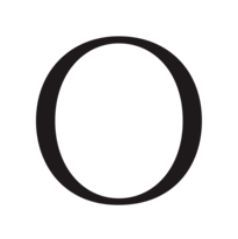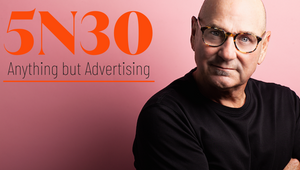
“This Is Not ‘Slightly-Longer-TVC’ Lions’”

How do you define entertainment in advertising and, more specifically, the work worthy of winning in Cannes Lions’ Entertainment Lions next week? For Jae Goodman, the Entertainment Lions jury president and CEO of Observatory, an important factor is that a piece of work was truly designed to entertain and not commercially interrupt. Sorry, two-minute extended cuts of 30-second ads, you do not make the grade.
Eager to pick Jae’s brains further on how he and his jury are approaching the judging, and his general views on the conflation of the two worlds of brands and entertainment, LBB’s Addison Capper caught up with him.
LBB> After a year and a half of Covid-19, why does the business and creative world need award shows?
Jae> Fair question. Many parts of the world are obviously still very much in the throes of the pandemic, and one could easily suggest that awards for business and creative are frivolous or even inappropriate.
But one could also suggest that - at an existential level and economic level - some semblance of a return to normalcy is necessary. Furthermore, a significant portion of the work we’re judging was developed during the pandemic and/or directly relates to it. Recognising all of that work is important, and recognising the best of it is the role of award shows.
I can confidently speak on behalf of the entire Lions Entertainment jury when I say that every conversation we have and decision we make is in the ever-present context of Covid-19.
LBB> You’ll be awarding 2020 and 2021 Lions – I know the years are being judged separately but it must be super illuminating to see the comparison between pre-Covid and Covid work. I know it’s still in the pre-judging phase, but have you noticed any trends or has it given you any new perspective on how the industry has changed?
Jae> Certainly there are entries from 2020 that your brain labels ‘pre-Covid’ in an instant, and it takes mental and emotional exertion to reframe and view objectively. And, of course, there is a lot of very powerful pandemic-related work.
As a jury, we talk about it a lot and are trying to be conscious of neither accidentally penalising a pre-Covid entry for an idea one might not pursue today, nor over-emphasising work done in and about the pandemic. To put a finer point on it, we are literally tracking the percentage of potential shortlist contenders as correlated to total entries pre- and in-pandemic. So, the work we award will be appropriately representative of the period in which it was created.
LBB> You’re heading up the Entertainment Lions - how do you define that category for yourself and your jury? What does excellence in the category mean to you?
Jae> First, Cannes Lions has done a terrific job of crafting very specific sub-category definitions which reflect true entertainment categories. This is hugely helpful in weeding out, for example, very slightly longer edits of well-known TVCs.
With regard to definition and excellence for me and the jury, it comes down to three questions:
- Is the work truly great? This is Cannes Lions, which represents the pinnacle of creativity globally. The work we award must be Cannes Lions worthy. I feel this is important because even in its tenth year ‘Entertainment’ is relatively new territory for brands, and therefore it might be excusable for the jury to award ambition alongside excellence. Ultimately, however, whether a brand produced it or not, an OK feature film is just an OK feature film, and only truly great work deserves a Cannes Lions.
- Is the entry’s primary format entertainment? As I mentioned above, this is not ‘Slightly-Longer-TVC Lions’, it is Lions Entertainment. We check ourselves on whether an entry’s work was designed to attract and engage an audience as entertainment does, or whether it was crafted to be a commercial interruption.
- Is there a clear and authentic connection to the brand and/or brand values? This is not entertainment for entertainment’s sake, this is entertainment which must also drive brand and business business results.
LBB> This has been a year that has seen the industry chuck out all of the rule books, so in some ways, this year’s Cannes Lions is a launchpad for the future – how does that frame how you’ll be looking at the work? Does it give the juries an extra responsibility?
Jae> I believe newer categories such as Lions Entertainment do have a particular responsibility to show the industry a way forward. We are all well aware that the power of interruptive advertising is rapidly diminishing globally - in particular TVCs and digital video - thanks to the rise of subscription-only streamers, prevalent time-shifting even in live-sports, ad blockers on mobile devices and the ‘six-second look-away’ on computers.
Each Lions Entertainment entry we award signals to the industry globally what successful brand entertainment looks like.
LBB> What advice will you be giving the jury?
Jae> I suppose those three questions I outlined above are a form of advice.
Also, I implore the judges to watch the entirety of the longer-form entries. In pre-judging, this means watching more-than-a-few full-length feature films and episodic series. The Academy Awards and Emmys are not based on trailers, promos and sizzles, neither are Lions Entertainment.
Along the same lines, I try to insist that each of us view the ‘supporting content’ and read the written entries, as they provide important detail and context.
Last, also regarding context, I encourage us all to take regional and local culture and entertainment norms into account. Judges from a particular region deserve a louder voice when the jury is discussing work from that region. And, if a region is not appropriately represented on the jury (I know Cannes Lions works very hard at this, but it’s imperfect), then it is the responsibility of our jury to seek out the cultural and contextual relevance of the entry.
LBB> How has branded entertainment evolved in recent years and what’s driven the change?
Jae> Brand entertainment is getting better and there is more of it. This is driven by the diminishing effectiveness of interruptive advertising, in particular upper funnel brand communications, and by the simple fact that more brands and more agency partners are committing to Brand entertainment as a serious and enduring part of their marketing strategy and tactics.
LBB> What are your views on the conflation of the two worlds of brands and entertainment?
Jae> Oh, there is so much debate here as to whether marketers are being subversive by creating entertainment that simultaneously creates affinity for their brands and products. Fair warning, I do love a good debate, and I also believe it’s healthy to interrogate the evolution of the relationship between brands and entertainment.
Here’s where I land: If a brand makes a great video game, then players of the game are playing it because it’s great. And, if players of that game choose to reward the car, beer or restaurant brand who provided the video game, great, that’s the whole idea. Everybody wins.
Some brand entertainment does not even expressly include the brand within it, but rather promotes the brand around the entertainment while the entertainment itself simply promotes the brand’s values, calculating that people who seek and enjoy entertainment with those values will also seek brands and products with those values. It’s the ultimate upper-funnel confidence play, and requires further confidence in one’s mid- and lower-funnel expertise. But, for those of us with a window on a decade’s worth of brand entertainment results - and a window on the results in the case studies entered in 2020 and 2021 Lions Entertainment - it’s clear that brand entertainment is a powerful marketing tool. I recall one DTC case wherein a powerful short film with no brand mention in it provided the highest total ROAS in the company’s 10-year history. This is a hardcore performance-marketer who was all about digital customer acquisition, and the film enhanced every aspect of the marketing mix.
So, to answer your question, I am all for the conflation. In fact, I’ve committed my career to it.
LBB> Cannes is also a time of celebration. What will you be celebrating this year?
Jae> We’ll be ‘celebrating’ great work in the form of Cannes Lions recognition, of course. But, until Covid-19 is eradicated across the globe, none of us think it’s particularly appropriate to be busting out the rosé.
LBB> What do you hope to see at Cannes 2022?
Jae> Humans, in person.











